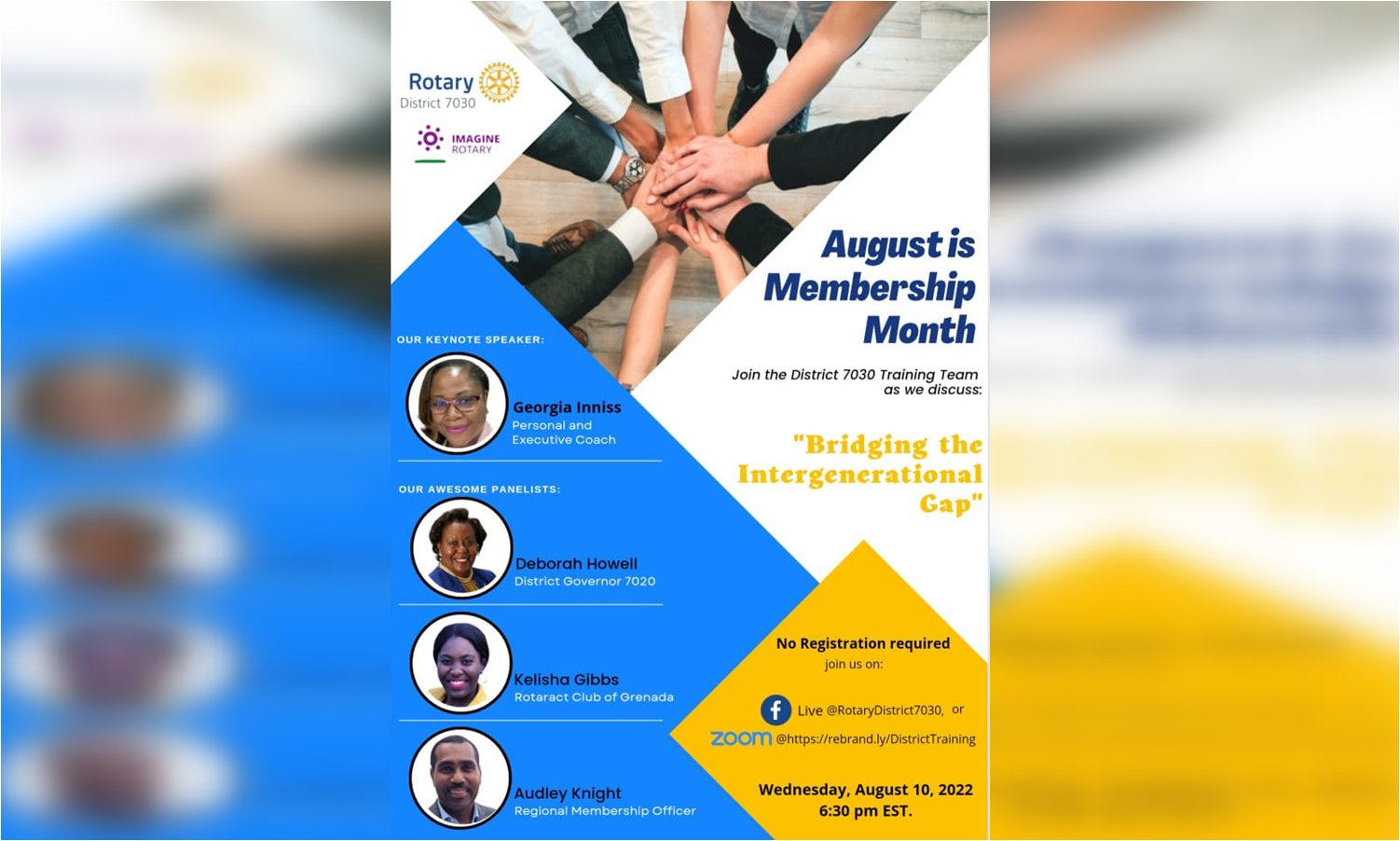
In case you missed the first District 7030 Training Series webinar on 10th August 2022 - “Bridging The Intergenerational Gap” - here is an excerpt from the keynote speaker.
GENERATIONAL GAP refers to the thoughts, beliefs, and ideologies that separate one generation from another. These can include beliefs on politics, business, race, and approach to decision making etc.
As organizations get increasingly age-diverse, they need to understand the communication and development strains this diversity can create, and how to overcome them. Currently, organizations are largely comprised of three generations: Baby Boomers, Generation Xers, and Millennials. Each generation grew up in slightly different cultures, with influential events that shaped them.
When I look at the genesis of the Rotary Club, I learnt that the first meeting was attended by an Attorney, an Engineer and Freemason, a Coal Miner and a tailor. You can’t be more diverse than that! Yes, they were from the same generation, however, the overarching goal for this meeting stemmed from a SHARED VISION! ROTARY’S VISION.
“Together, we see a world where people unite and take action to create lasting change — across the globe, in our communities, and in ourselves.”
In pursuing such a goal, it is important for individuals to increase their level of emotional intelligence, which in a nutshell means to build the capacity to be aware of, control, and express one's emotions, and to handle interpersonal relationships judiciously and empathetically. This calls for increased self-awareness and also knowledge of what characterizes the different generations.
Here is a quick description of each of the generations:
- Baby Boomers prize fairness and individual rights, personal growth and freedom of expression. They are motivated internally when they can have ownership, receive recognition and feel needed. After feeling judged and deprived by their parents of the older Generation, they are very sensitive to feedback and uncomfortable with conflict.
- Generation Xers prefer diversity, fun, self-reliance, and nontraditional approaches. They are willing to work hard, but will not be taken advantage. Generation Xers were the first generation to have equally strong internal and external goal motivation. They seek guidance from their values and aspirations, and are equally adept at responding to a changing external landscape. They are both responsible and responsive.
- Millennials are tenacious, heroic, savvy, and technologically advanced. They possess self-efficacy and a belief in their abilities to handle whatever comes their way. This could be why 72 percent of Millennials feel that their organizations are not making full use of the skills they have to offer. Generally, Millennials are motivated by challenge, action, unconditional acceptance, and change.
Different motivating factors, skill sets, and goals can make it very difficult for a team to work together cohesively. Even worse, without open conversation about the intergenerational organization like Rotary International, drama can start to spread, take over and prevent teams from achieving their goals. For example, a Baby Boomer may see a smart and energetic Millennial quickly suggests and designs new projects, being able to run them with less effort and are being rewarded with congratulations. The Boomer may argue that it’s not fair, given that the Millennial doesn’t have as much tenure in the organization to show that level of independence. This can quickly create negative assumptions on both sides. To mitigate such situations, according Dr. Nate Regier, Co-Founder, Owner, and Chief Executive Officer, Next Element, there are five ways to improve communication between every generation in an organization:
- Understand each generation’s motivating factors and influences
- Identify general communication preferences
- Accept the team’s differences.
- Focus on continuous learning
- Develop mentor relationships
AND SOMETIMES WE NEED TO BE REMINDED THAT OUR DIFFERENCES THAT MAY IMPEDE SUCH A VISION……. ARE OPPORTUNITIES FOR OUR LEARNING…
Article By: Georgia E. Inniss – MBA, CPEC
Au cas où vous auriez manqué le premier événement de la Série de Formations le 10 août 2022 - "Combler le fossé intergénérationnel" - voici un extrait de notre conférencier principal.
L'ECART GENERATIONNEL désigne les pensées, les croyances et les idéologies qui séparent une génération d'une autre. Il peut s'agir de convictions sur la politique, les affaires, la race, l'approche de la prise de décision, etc.
Les organisations étant de plus en plus diversifiées sur le plan de l'âge, elles doivent comprendre les difficultés de communication et de développement que cette diversité peut engendrer, et comment les surmonter. Actuellement, les organisations sont en grande partie composées de trois générations : les baby-boomers, la génération X et les milléniaux. Chaque génération a grandi dans des cultures légèrement différentes, avec des événements influents qui les ont façonnées.
Lorsque j’observe la genèse du Club Rotary, j'ai appris que la première réunion a rassemblé un avocat, un ingénieur et un franc-maçon, un mineur de charbon et un tailleur. On ne peut pas être plus diversifié que cela ! Oui, ils étaient de la même génération, mais l'objectif primordial de cette réunion découlait d'une VISION PARTAGÉE ! LA VISION DE ROTARY.
"Ensemble, nous voyons un monde où les gens s'unissent et agissent pour créer un changement durable - à travers le monde, dans nos communautés et en nous-mêmes."